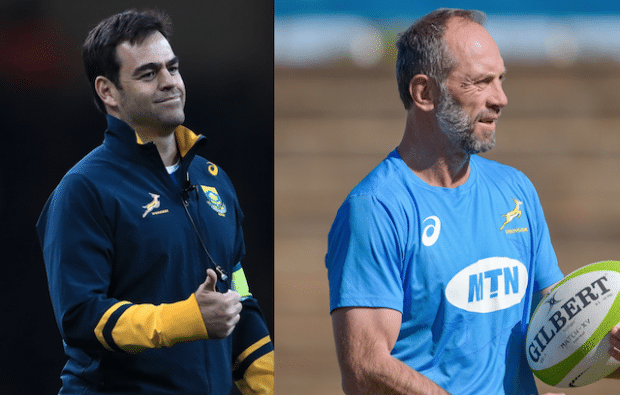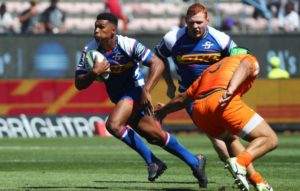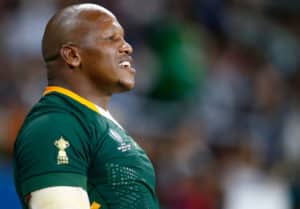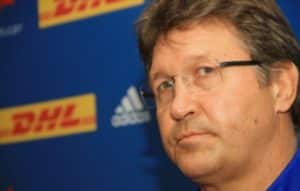A bizarre situation that sees the Springboks losing their lineout coach and defence specialist in the middle of a four-Test tour could have have been avoided, writes JON CARDINELLI in Paris.
Johann van Graan’s move to Irish club Munster has been on the table for some time. The Springboks have known since Brendan Venter began his stint as a defence and exits coach that he would be unavailable for the Test against Italy on 25 November.
How is it that the Springboks now find themselves in a situation where they will wave goodbye to both Van Graan and Venter at the halfway point of the four-Test tour? SARugbymag.co.za understands that Venter won’t be returning for the final tour fixture against Wales. How is it that no plans were put in place to fill these positions before the tour?
Four days after the Test between Ireland and South Africa in Dublin, and the Irish media is still trying to work out why Rassie Erasmus – the former Munster coach who was recently appointed South Africa’s new director of rugby – wasn’t consulted ahead of the clash at the Aviva Stadium. Coetzee brushed aside questions regarding Erasmus’ involvement in the buildup to that fixture. Clearly he felt that the incumbent coaching staff didn’t need any ‘outside’ help.
The performance as well as the scoreline at the Aviva Stadium confirmed what many believe to be true: this Bok side needs all the help it can get.
On Monday, Coetzee told the media that himself, Matt Proudfoot and Franco Smith would pick up the coaching slack following the departure of Van Graan and Venter. He attempted to assure those at the press conference that the loss of a lineout coach and defence and exits specialist wasn’t a massive setback.
It would appear as if the Bok coaches and players aren’t thinking beyond the next game against France. At least not yet.
On Tuesday, Smith admitted that it was ‘tough’ to lose these coaches midway through the tour. Like Coetzee, the attack coach hopes that the management team won’t be affected by Van Graan and Venter’s departure.
‘I’m a head coach so I’ve been involved in coaching various aspects for a long time,’ he said. ‘Matt has been involved in the lineouts before. We’ve got specific directives. As the data arrives, Allister will look at exactly how it’s going to work going forward.
‘I’ve very happy to be involved with the kicking and exits,’ added the former Bok flyhalf. ‘It’s been part of my DNA for a long time. And the breakdown is part of the attack, so Johann and I will discuss it before he leaves.
‘Obviously it’s more responsibility, but I’ve been a head coach for 12 years so it’s not going to be an influence. We’re going to concentrate a lot on our recent performances and execution going into the last two weeks of the tour.
‘I think we will be fine. Obviously we’re sad to see both of them go, especially in the middle of the tour. It is tough, but we are 100% prepared for it and the players knew from the start how we would deal with it. We’re really excited.’
The Springboks have won nine of their 22 Tests under Coetzee. The current management team – with Smith and Venter in tow – has been together for nearly a year.
The Springboks haven’t won a Test in their last five attempts. The attack has been particularly ineffective. The Boks failed to score a single point in Albany, and then contributed just three points to the recent match in Dublin.
Smith, however, feels that the side needs more time to gel and has called for more patience from the public.
‘I always say: it’s like when a burglar gets into someone’s house. You feel that you’re prepared, but then it still happens.
‘Success at the collision is dependent on the success at the breakdown. Ireland did very well to slow us down there. They had nine turnovers at the breakdown. We had two kickable penalties and we took one of them. We weren’t creating pressure and forcing the opposition to impede.
‘Maybe one or two of the players who weren’t used to the conditions made some indifferent decisions against Ireland. I don’t think people appreciate how much the conditions play a part in the northern hemisphere. Ireland understand those conditions and their players have been together for a long time.
‘Overall I feel the attack has grown this season. We’ve adapted to a new structure. We’ve empowered the players a lot more. Now we have to start correcting the decision-making.
‘It takes a bit of time to build a new side,’ he continued. ‘We’ve been together for 10 games now. It works out to about 580 minutes of attack time. The more we play together and get the hang of Test rugby the better we will get.’





